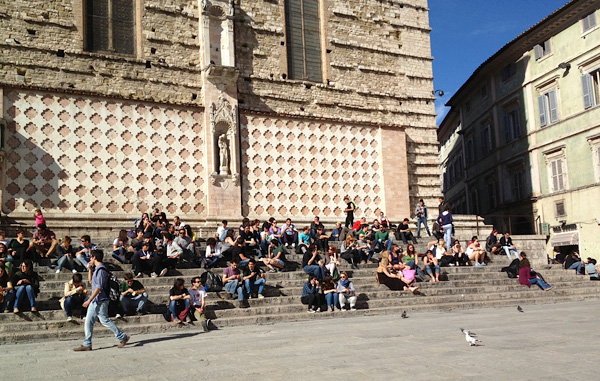Like most of my colleagues at CorpCounsel.com, I spend most weekdays in our newsroom/cubicle farm, staring at my iMac’s screen. But they let us out every now and then for good behavior, and I decided to be paroled to Perugia, a small university city in central Italy. For a few days, in theory, I wouldn’t think about alternative billing, e-discovery, or the Foreign Corrupt Practices Act.
Well, not so much. The Wal-Mart bribery scandal broke a day after my arrival, and as if to reinforce it, I had lunch with our cover guy from the March print edition of Corporate Counsel, Eni S.p.A. general counsel Massimo Mantovani. He summoned me to Ristorante Piperno in Rome’s old Jewish quarter, famous for its carciofi alla Giudia—flattened and fried artichokes.
I wasn’t interviewing Mantovani on the record, so I can’t go into specifics. He runs one of Italy’s biggest legal departments, some 300 lawyers, and its place in the country’s corporate counsel world is somewhat comparable to that of General Electric’s—both in its predominance and its alumni, who’ve scattered throughout Italy’s companies and law firms. We chatted about the increasing globalization of legal departments everywhere (the U.S. is not an exception, either, he noted) and what he worries about these days. We both brought up the Wal-Mart scandal—and Mantovani talked about how compliance is, more and more, dominating his thoughts and those of his colleagues.
Back in Perugia, I arrived in time for the start of its annual International Journal Festival. This city loves its festivals—Umbria Jazz takes place in July, and features luminaries like Sonny Rollins and even non-jazz performers like Sting and Prince. If it’s October, it’s time for Eurochocolate; one of the city’s biggest employers, the Nestle subsidiary Perugina, produces the famous Baci chocolate-hazelnut confection to the rhythm of some 1.5 million pieces a day.
The journalism festival is an amazing event. It’s all free to attend, and there are panel discussions, workshops, debates, and films throughout Perugia’s historic center. Festival-goers merely have to show up, and a platoon of young people keep the events running smoothly while print, online, and television journalists run around the town and keep the restaurants and bars humming.

For me the festival started with two documentary filmmakers, Gustav Hofer and Luca Ragazzi, whose recent film Italy—Love It or Leave It won them international acclaim and generated quite of lot of soul-searching here. This country has a long, often sad history of sending its people abroad in search of a better life. In recent years, the exodus has featured educated young people who can’t find work after getting their degrees. (Hmmm . . . sounds familiar.)
Festival officials showed the film first, and then threw the medieval city hall venue open for debate among the filmmakers and an expat, and then the audience. For more details, go to i-italy.org.
Today, the IJF’s day two, was busier. Columbia Journalism Review Online’s Justin Peters led The Economist’s Mark Johnson, Charlie Beckett of POLIS/The London School of Economics, and Lucy Chambers of the Open Knowledge Foundation in a discussion of how social media helps connect journalists and their audience—or not.
One of the fascinating tidbits from Johnson was that the editors at his magazine and website found that a big chunk of readers prefer to share their thoughts about articles on third-party sites such as Facebook, rather than in the article’s comments section on economist.com. So they’ve been trying various ways to make it easier to comment, such as letting unregistered visitors say their piece before they (hopefully) register.
Another U.K. contingent livened up an afternoon session on the News International phone hacking scandal. The Guardian’s Amelia Hill (who helped break the news and said that NI’s in-house legal team wasn’t untouched by the scandal) and The Times’s David Aaronovitch locked horns over whether readers really care, and the ultimate effects of the episode. Will the government, or some ministers resign? Will News Corp. boss Rupert Murdoch leave the news business, as some shareholders and execs have demanded?
It’s a story that will unfold over the next few months. And the festival in Perugia has a few days left to go. Based on the IJF’s first days, it’s clear to me that my days away from the CorpCounsel offices won’t be disconnected from the goings-on in the in-house world. Away in Perugia, the corporate-law news keeps coming, and it fixes my attention in any language.





